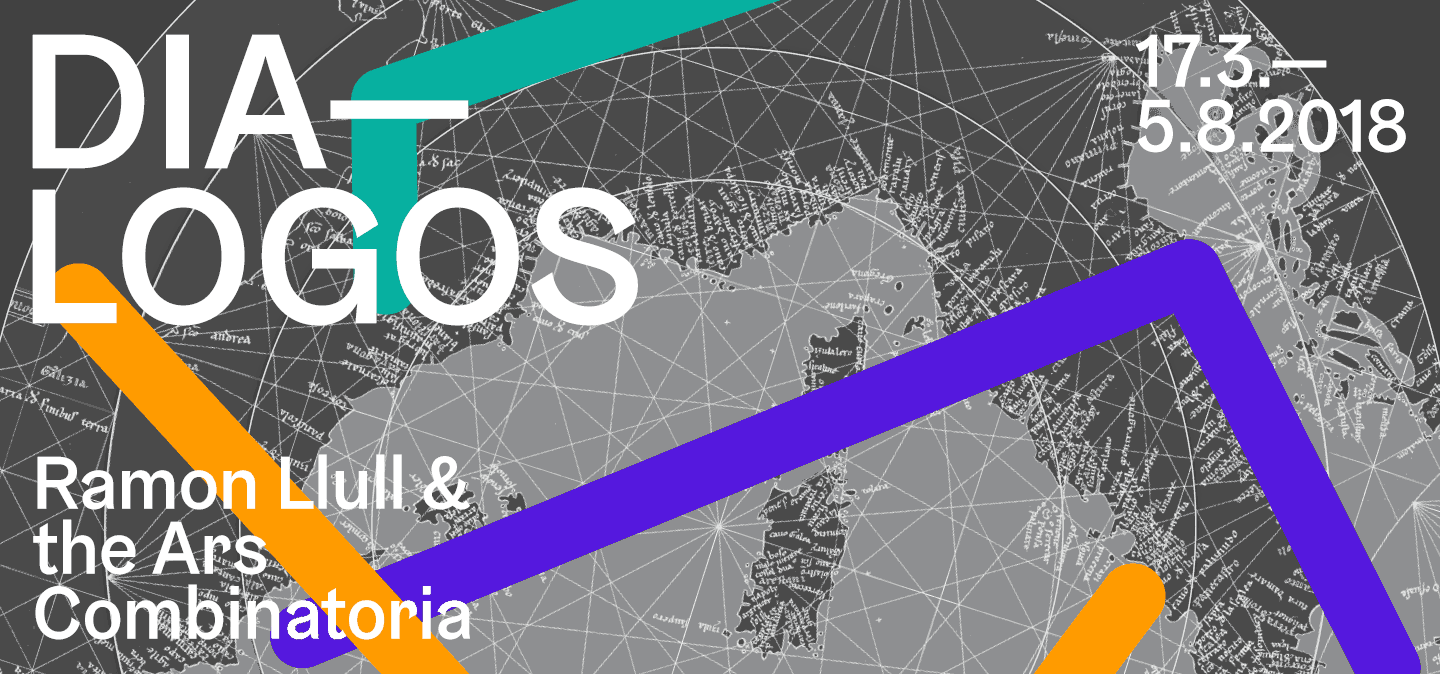Ramon Llull and the ars combinatoria
March 17–August 5, 2018
DIA-LOGOS presents a radical challenge to the still common perception of the Middle Ages as a “dark” epoch. Ramon Llull (c. 1232–1316) is revealed as an enlightened thinker who is extremely relevant—and topical—for today’s world. The Catalan philosopher and theologian, who was born in Majorca, not only invented a new method in terms of theory and language to gain knowledge and a construction of the world, like an engineer he also translated the method into an apparatus. His device consisted of several connected paper disks with concepts inscribed on them. By rotating the disks, the linguistic symbols displayed could be connected, correlated, and combined. He had invented so to speak, avant la lettre, a kind of logical machine (a paper computer), which could physically effect the combinations of terms.
The aspiration of the method invented by Llull was universal, and it introduced a new kind of learning. It postulated the unity of the various contemporary disciplines of knowledge, and envisaged that through deduction, argumentation, and dialogue there would be peace among the three monotheistic religions. His main work Ars generalis ultima, and/or Ars brevis, was published in 1308, first in Latin, and later translated into Hebrew (1476) and Arabic (1682). Long before Gottfried Wilhelm Leibniz, Ramon Llull strived to put reason in the service of religion, and not religion in the service of irrationality. Llull is one of the greatest founders and most enlightened minds of European culture, which is dedicated to the trinity of humanism, Renaissance, and Enlightenment. His universal concepts and intercultural ideas can be found to this day in literature, the visual arts, music, and philosophy, as well as in information theory and media technology. This enormous influence of Llull’s radical concept is the main focus of the exhibition, which presents numerous treasures from and about Llull from regions all over the globe. By merging historic and documentary materials with contemporary artworks that engage with Llull’s work, the exhibition enables insights into surprising and thus far unknown facets of Llull’s way of thinking and his work.
A collaboration between ZKM, Karlsruhe University of Arts and Design (HfG), Centre de Cultura Contemporània Barcelona (CCCB), ArtLab, École polytechnique fédérale de Lausanne.
Curators: Amador Vega, Peter Weibel, Siegfried Zielinski
Curatorial assistant and project manager: Bettina Korintenberg
Project assistant: Daniel Irrgang
With works by: Abraham Abulafia, Friedrich Achleitner, Johann Heinrich Alsted, Peter Apian, Ralf Baecker, Manuel Barbadillo, Konrad Bayer, Berlin Society for Nontrivial Pursuits (S4NTP), Michael Bielicky, Kamila B. Richter, Jorge Luis Borges, John Cage, Italo Calvino, Juan Eduardo Cirlot, Gianni Colombo, Honorius Cordier, Werner Künzel, Nicholas of Cusa, Salvador Dalí, Joan Desí, Götz Dipper, Manfred Hauffen, Umberto Eco, Sabine Groschup, Márton Fernezelyi, Miklós Peternák, Zoltán Szegedy-Maszák, Johann Balthasar Friderici, Johann Wolfgang von Goethe, Philipp Goldbach, Matthias Gommel, Jean-Jacques Grandville, René Grillet, Philipp Matthäus Hahn, Gisbert Hasenjaeger, Curt Herzstark, Sarah Kenderdine, Jeffrey Shaw, Edwin Thumboo, Anselm Kiefer, Yunchul Kim, Athanasius Kircher, Pe Lang, Bernard de Lavinheta, Gottfried Wilhelm Leibniz, Thomas Le Myésier, Yehudah ha-Levi, Sol LeWitt, Daniel Libeskind, David Link, Ramon Llull, Jennifer and Kevin McCoy, Josep Maria Mestres Quadreny, Manfred Mohr, William Morris, Luis Negrón van Grieken, Juan Orozco Velazquez, A. Michael Noll, Valère Novarina, Bartolomeo Olivo, Santiago Ortiz,Jorge Oteiza, Perejaume, Otto Piene, Giovanni Battista della Porta, Francesc Pujols, Raymond Queneau, Ludovicus Cornelius Rigius, Petrus Roselli, Marius Schneider, Arnold Schönberg, Raymond of Sabunde, semiconductor (Ruth Jarman, Joe Gerhardt), Adam Slowik, Josep Soler, Josep Maria Subirachs, Antoni Tàpies, Philipp Tögel, Jacint Verdaguer, José María Yturralde
Partners: Badische Landesbibliothek, Heinz Nixdorf MuseumsForum
Sponsored by: Ernst von Siemens Kunststiftung
With the kind support of: Koreanisches Kulturzentrum

